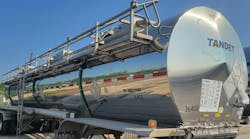Logistics specialist Hoyer Group now uses lightweight tanks made of composite material. In October 2015 the Hamburg, Germany-based company already put into operation its 15th composite tank from the Dutch manufacturer Tankwell, with whom the innovative container was developed a year and a half ago. The test phase with the initial customers proceeded to the great satisfaction of all those involved.
The composite tank containers earned Hoyer the BASF Global Supplier Award 2015 in the sustainability category. BASF honored outstanding concepts by its partners in the context of the Global Supplier Day.
The Ludwigshafen, Germany, chemical company was the first user of the Hoyer composite tanks, and has accompanied its development since its design concept phase and uses them in various product areas. Further possible uses are currently being examined together with Hoyer.
The special characteristic feature of fiberglass-reinforced plastic tanks is their low weight of just 2,200 kilograms (4,850 pounds) for a 31,000-liter (8,189-gallon) capacity. Thus the load capacity of composite containers is about two tons larger compared to conventional steel tanks. This is made possible by a special composite material that also has good thermal properties and reduces heating processes.
Ulrich Graupe, Hoyer’s director of equipment management, says: “The composite tanks have already been operating on certain selected routes since early 2015, and have now successfully completed more than 500 transport movements. This development jointly with Tankwell is further proof of our company’s innovative approach for the benefit of our customers.”
Graupe adds: “We save both energy and transport costs by using composite tanks, and we reduce the number of traffic movements through their high load capacity. We thereby lower the CO2 emissions of our transport operations, thus continuing the positive effect we have already achieved in past years.”
Hoyer’s leadership has set an internal target of using a series of actions to reduce the amount of CO2 per tonne-kilometer throughout the company by a total of 25% by 2020.








